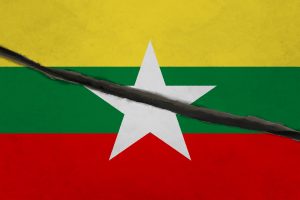Myanmar’s military government has enacted a harsh new electoral law that imposes punishments, including the death penalty, for anyone opposing or disrupting the elections it has pledged to hold in December.
According to a report in yesterday’s edition of the state-run Global New Light of Myanmar, the law, which was passed on July 29, “aims to prevent obstruction and disruption of the work process of the multiparty democratic general elections.” The law is also intended to prevent the disruption of the pre-election campaign period, ensure the safety of poll workers on election day, and prevent any “disruption and obstruction of the right of eligible voters to cast their votes freely under safe and secure conditions.”
Characteristically, the law defines “obstruction and disruption” very broadly. According to the Associated Press, anyone who “orates, speaks, organizes, incites, protests or distributes letters to disrupt any part of the electoral process” can be sentenced to three to 10 years imprisonment, as well as a fine.
The law also levies prison terms of between three years to life for anyone who threatens, obstructs, abuses or severely hurts any personnel of the election commission, candidates, or voters. Anyone found guilty of damaging or destroying any equipment or materials used in elections, including ballot papers, or any related building or structure, faces a sentence of between five years and life imprisonment.
“If the action results in the death of a person,” the law says, “each person involved shall be sentenced to death.”
The junta has long planned to hold elections as a means of transitioning power to a quasi-civilian government and resolving the conflict that has raged since its overthrow of Aung San Suu Kyi’s civilian government in February 2021.
Yesterday, junta leader Senior Gen. Min Aung Hlaing gave a speech in Naypyidaw in which he affirmed the plan to hold the election in December and called on the public to support the process. “Just as in the 2020 election, efforts must be made to prevent electoral fraud and to protect against those who wish to disrupt or sabotage the election,” he said, as per the Global New Light. “Only through the united support, cooperation, and diligent efforts of the entire population can the election be successfully conducted.”
The junta’s election plan has been widely denounced both by resistance groups and independent observers as a charade designed to enshrine military rule behind a civilian façade. In 2023, the military State Administration Council, as the junta refers to itself, dissolved 40 political parties, including the NLD, which won both the 2015 and 2020 elections in a landslide, and has exercised tight control on which parties can register for the upcoming polls.
The SAC’s election plans are likely to be complicated by the insecure political conditions that still prevail in much of the country, which have forced it repeatedly to delay the election plan. While the frontlines appear to have stabilized in many parts of Myanmar after considerable resistance gains in late 2023 and most of 2024, the election is likely to be widely boycotted and, in some cases, contested through force of arms.
The law is clearly intended to equip the military administration with the legal wherewithal to quash what is likely to be widespread resistance to the election plan. This may allow the junta to hold some limited form of election in the areas that remain under its control. The result may even be accepted by some foreign nations looking for an excuse to normalize their relations with Naypyidaw. However, it is all but certain that the new “civilian” government will continue to face strong opposition from resistance groups and much of the population, pushing the country’s civil war into a new phase.

































